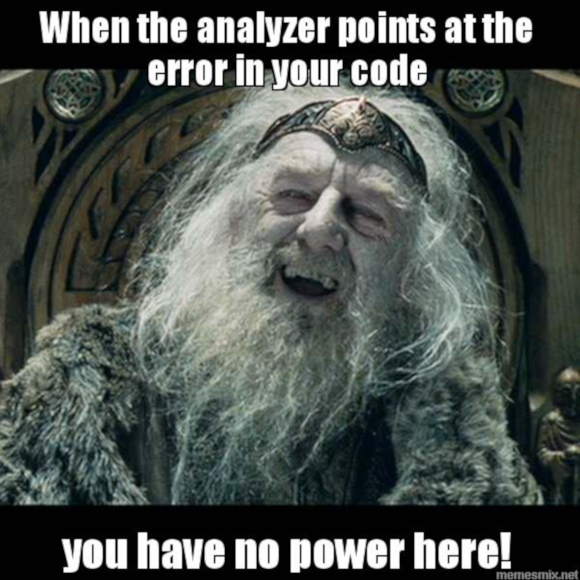
We welcome any chatting on code quality. Our clients, students, and other users from all corners of the Internet write to us. Regardless of the country, time zone or language. Well, speaking language, not programming. Among programming languages, we are so far interested in a limited set. Right now, it's C, C++, C# and Java. There are many benefits from communication. We implement some users' suggestions immediately, because they are really useful. Often we just lend a hand with someone's project by explaining analyzer warnings, which end up being errors. This note is about such case.
About the analyzer
PVS-Studio is a tool designed to detect errors and potential vulnerabilities in the source code of programs, written in C, C++, C# and Java. It works in Windows, Linux and macOS environment.
There are three feedback forms to contact us:
Thursday night
One active user who tried the analyzer on his code actively started sending false warnings. Before I could answer, there were already 3 emails. It was the end of the working day and I was tired (speaking about the question of reliability of manual code review). Our team was actively preparing for a high-wrought release, which was a few days away.
I decided to answer on Friday or even during the next week:
Hello Constantine.
We'll review your warnings. Next week I will comment on suspicious places:-)
This note is about effectiveness of static code analysis. Manual code review will be inferior to automatic check in many cases, especially at the end of the day.
With the user's permission, I will cite you our mails:
Email 1
False-positive V712 warnings:
uint32_t StartUpCounter = 0, HSEStatus = 0;
RCC->CR |= ((uint32_t)RCC_CR_HSEON);
/* Wait till HSE is ready and if Time out is reached exit */
{
HSEStatus = RCC->CR & RCC_CR_HSERDY;
StartUpCounter++;
} while((HSEStatus == 0) && (StartUpCounter != HSE_STARTUP_TIMEOUT)); // V712...Email 2
V715 false positive for the same fragment:
{ // V715 ... lpmode.cpp 356
HSEStatus = RCC->CR & RCC_CR_HSERDY;
StartUpCounter++;
} while((HSEStatus == 0) && (StartUpCounter != HSE_STARTUP_TIMEOUT));Email 3
Holy cats, such a haunted place! The analyzer complains about the same fragment (see the code from the previous emails):
V560 A part of conditional expression is always true: (StartUpCounter != ((uint16_t) 0x5000)). lpmode.cpp 356
V776 Potentially infinite loop. The variable in the loop exit condition 'HSEStatus == 0' does not change its value between iterations. lpmode.cpp 356
Maybe I don't get something? But in practice everything works, and if the quartz does not start, then we exit this fragment on timeout;-)
Email 4 (reply)
Hello Constantine.
We'll review your warnings. Next week I will comment on suspicious places:-)
Email 5
Damn it! Only after your email, I noticed that the statement «do» is missed… Finally, all fell into a groove! Seems like I completely lost my eye sharpness %)
do {...} while (...);
Conclusion
As you may have noticed, there were 4 analyzer warnings for the same fragment, but it still took time to convince the user that there was an error. In such a situation, manual review would not even have a chance.
A similar story with happy ending: "How PVS-Studio Proved to Be More Attentive Than Three and a Half Programmers"
Use static analyzers in your project. They don't replace code review with colleagues, but add support to code quality control.